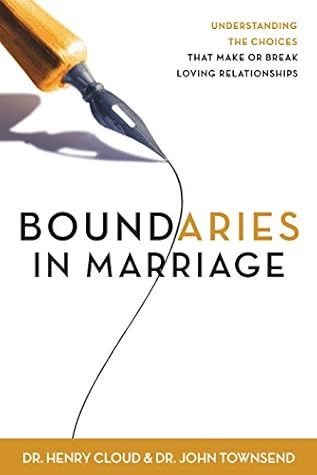More on this book
Community
Kindle Notes & Highlights
Some people think the Law of Respect is the “bad guy”
it doesn’t teach us about setting boundaries but, rather, submitting to the boundaries of others.
The Law of Respect states that if we wish for others to respect our boundaries, w...
This highlight has been truncated due to consecutive passage length restrictions.
There is no such thing as a ...
This highlight has been truncated due to consecutive passage length restrictions.
We can’t expect others to cherish our limits if we don...
This highlight has been truncated due to consecutive passage length restrictions.
We all get excited about finally being able to say no, set limits, and become free to choose, but we don’t fe...
This highlight has been truncated due to consecutive passage length restrictions.
The Law of Respect fosters love.
Loving your mate means desiring and protecting her freedom of choice.
It means dying to your wish for her to see things your way and appreciating that she has her own...
This highlight has been truncated due to consecutive passage length restrictions.
pain
injury.
Megan felt no pain when she shopped extravagantly. Yet the marriage was being injured by her impulsi...
This highlight has been truncated due to consecutive passage length restrictions.
She wasn’t feeling hurt, but a great deal of harm...
This highlight has been truncated due to consecutive passage length restrictions.
When Trent set limits on the credit card, the converse was true. Megan felt a lot of pain, but n...
This highlight has been truncated due to consecutive passage length restrictions.
Trent reduced the spending limit and asked Megan to agree to not use the card for a month every time she went over the limit. Megan was angry and resentful toward Tren...
This highlight has been truncated due to consecutive passage length restrictions.
In fact, she began...
This highlight has been truncated due to consecutive passage length restrictions.
She was in pain, but she was not being injured. In fact, she was healing.
Just because someone is in pain doesn’t necessarily mean something bad is happening. Something good might be going on, such as a spouse learning to grow up. And this is the essence of the Law of Evaluation: We need to evaluate the pain our boundaries cause others. Do they cause pain that leads to injury? Or do they cause pain that leads to growth?
It is unloving to set limits with a spouse to harm him. This is revenge, which is in God’s han...
This highlight has been truncated due to consecutive passage length restrictions.
Sometimes discomfort is an opportunity for growth.
The most powerful obstacle to setting boundaries in marriage is envy.
The Law of Envy states that we will never get what we want if we focus outside of our boundaries on what others have. Envy is devaluing what we have, thinking it’s not enough. We then focus on what others have, all the while resenting them for having good things we don’t possess.
focused upon the happiness of others. Do not confuse envy with desire. Desire
The Law of Activity states that we need to take the initiative to solve our problems rather than being passive.
You may indeed have limits, definitions, feelings, and opinions, but you may not be communicating these to your spouse. A boundary that is not communicated is a boundary that is not working. It has the same net effect in the marriage as if there were no boundary.
The Law of Exposure states that we need to communicate our boundaries to each other. God designed boundaries to promote love and truth. Spouses need to make clear what they do or don’t want. They need to work on understanding what their spouse is saying about their boundaries. When boundaries are “exposed,” two souls can be connected in the marriage. But when boundaries are unexposed, spouses are less emotionally present in the marriage, and love struggles.
Though you may share no blame in creating
The “innocent” spouse needs to see what part, active or passive, he plays in the problem. Jesus called this the plank in our eyes: “First take the plank out of your own eye, and then you will see clearly to remove the speck from your brother’s eye” (Matthew 7:5). This plank may be some attitude or emotion we aren’t aware of that encourages the problem to continue.


